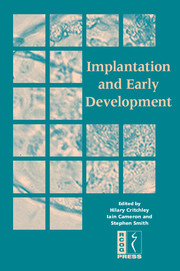Book contents
- Frontmatter
- Contents
- DECLARATION OF INTEREST
- Participants
- Preface
- SECTION 1 PREPARATION FOR IMPLANTATION – THE UTERINE ENVIRONMENT
- SECTION 2 THE EMBRYO
- SECTION 3 LESSONS FROM ANIMAL MODELS (TRANSGENICS) AND NOVEL TECHNOLOGIES
- SECTION 4 CLINICAL SEQUELAE
- 17 Sporadic early pregnancy loss: aetiology and management
- 18 Recurrent miscarriage – the role of prothrombotic disorders
- 19 Reproductive disorders and pregnancy outcome
- 20 Risk factors for first-trimester miscarriage: summary of results from the National Women's Health Study
- 21 Single-embryo transfer
- 22 Paediatric outcome after assisted reproductive technology
- SECTION 5 CONSENSUS VIEWS
- Index
18 - Recurrent miscarriage – the role of prothrombotic disorders
from SECTION 4 - CLINICAL SEQUELAE
Published online by Cambridge University Press: 05 June 2014
- Frontmatter
- Contents
- DECLARATION OF INTEREST
- Participants
- Preface
- SECTION 1 PREPARATION FOR IMPLANTATION – THE UTERINE ENVIRONMENT
- SECTION 2 THE EMBRYO
- SECTION 3 LESSONS FROM ANIMAL MODELS (TRANSGENICS) AND NOVEL TECHNOLOGIES
- SECTION 4 CLINICAL SEQUELAE
- 17 Sporadic early pregnancy loss: aetiology and management
- 18 Recurrent miscarriage – the role of prothrombotic disorders
- 19 Reproductive disorders and pregnancy outcome
- 20 Risk factors for first-trimester miscarriage: summary of results from the National Women's Health Study
- 21 Single-embryo transfer
- 22 Paediatric outcome after assisted reproductive technology
- SECTION 5 CONSENSUS VIEWS
- Index
Summary
A thrombophilic defect is an abnormality in the coagulation pathways that predisposes an individual to thrombosis. Although the presence of the defect need not necessarily result in thrombosis, it may weaken the ability to deal with an additional prothrom-botic insult,such as the hypercoagulable state of pregnancy. During the past few years, the antiphospholipid syndrome, an acquired thrombophilic disorder, has become established as the most important treatable cause of recurrent miscarriage. Interest has now focused on the potential role that other thrombophilic defects (both inherited and acquired) may be playing in the aetiology of recurrent early miscarriage and later pregnancy complications.
In this chapter we will develop the hypothesis that some women with a history of recurrent miscarriage (RM) are in a prothrombotic state outside of pregnancy. Further, that this state is exaggerated by the known haemostatic changes that occur during pregnancy, leading to defective placentation and pregnancy loss. The importance of reproductive haemostasis has only just started to emerge and is already proving to be an exciting new field of research and clinical investigation.
Definitions of pregnancy loss
Human reproduction is a surprisingly wasteful process. No more than 50% of all fertilised eggs result in a live birth and at least 15% of clinically recognisable pregnancies end in a miscarriage. Miscarriage is therefore the most common complication of pregnancy and is most frequently due to a sporadic fetal chromosomal abnormality, the risk for which rises with increasing maternal age.
Keywords
- Type
- Chapter
- Information
- Implantation and Early Development , pp. 229 - 239Publisher: Cambridge University PressPrint publication year: 2005

